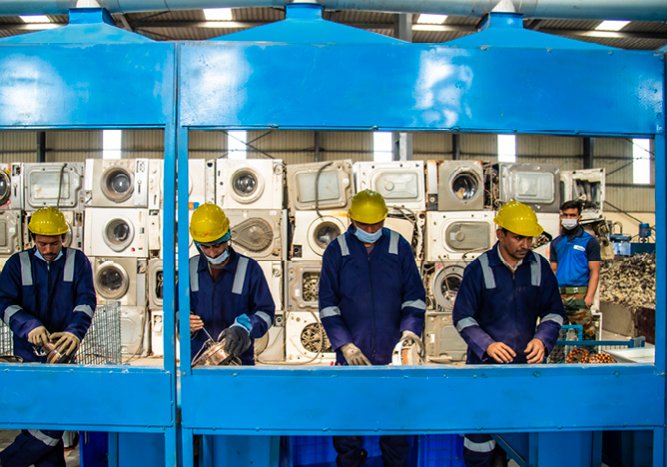E-waste recycling in Delhi: Leveraging recycling for E-waste in Delhi amounts to facing requirements for large-scale electronic waste disposal and E-waste management recycling solutions for an entire zone.
/img/B0/beg/Bubr/b6p41eT1Axn40/JpwEL8Er5r/ZE5Lih8mHwYsr2x4.jpg)

What Is E-Waste Management
● E-waste management refers to the overall apparatus and methodology of a solution deployed to efficiently and effectively manage E-waste in its totality, with the ultimate aim of recycling and incorporation into circular economy models.
● E-waste management for an entire city would leverage supply chains for the collection, processing, sorting, and eventual handling of complex E-waste/WEEE waste streams.
● E-waste management encompasses supply chain aspects of service management (SM) and change management (CM) to incorporate robust services and solutions. SM and CM are used for monitoring performance metrics, optimisation, and compliance. In contrast, CM is used to keep up with the increasing complexity of electronic waste and appliances in the latter.
E-Waste Management Incorporates Policy And Community Engagement.
● As E-waste supply chains require policy and community engagement for recycling.
● E-waste management incorporates approaches for policy and community engagement.
● Effective management of any waste stream in a location requires regulation, control and support by relevant parties from private and public sectors, where the convergence establishes guidelines and clear procedures for efficient results for waste streams and recycling, sustainable outcomes.
● E-waste/WEEE is a complex waste stream.
● The development and incorporation of E-waste recycling In 2024, on a comprehensive and nationwide level, has remained elusive, creating this emerging as a significant challenge. Among core sets of factors that are limiting a nationwide & comprehensive E-waste recycling solution are the complex composition of E-waste streams:
E-waste is an inhomogeneous waste stream composed of several complex materials in terms of composition and fabrication: precious metals, semi-precious metals, plastics, rubber, and a host of polymers, alloys, and metallic/non-metallic components.
E-waste
1. E-waste Production Exceeding Demand: E-waste generation at annual rates outstrips the capacity for infrastructure to process it adequately. Thus, in 2022, only 1 percent of E-waste was reportedly recycled in India.
2. Complexity of E-waste: E-waste consists of a diverse, unstandardised mix of devices and materials. Its complexity makes it a difficult waste stream for uniformity and standardisation. Every device and appliance remains unique and requires specialised treatment processes for differing components such as plastics, metals, and hazardous substances.
Conclusion:
These challenges underscore the need for significant advancements in solutions centring on organisations, solutions for technology and policy to improve the efficiency of e-waste recycling systems to tackle the complex and large-scale volumes emitted/generated. Endeavor Recyclers is a recycling specialist leveraging flexible, scalable solutions for E-waste management and supply chains of waste streams in terms of recycling, reuse, and the circular economy.
